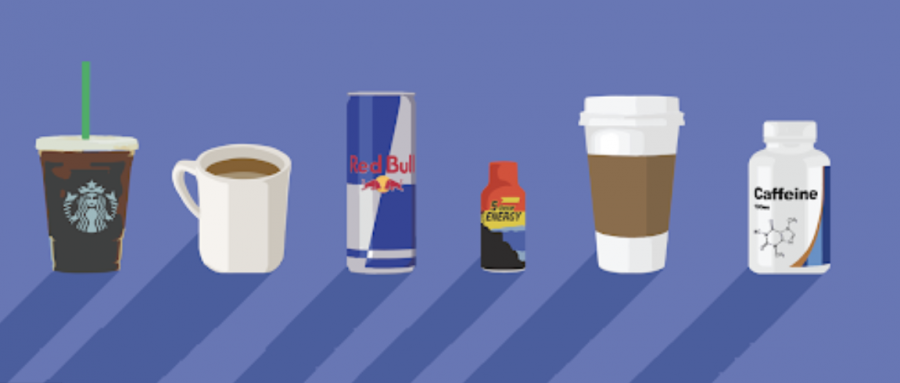Caffeine: The fuel for college students
It keeps us awake, and wakes us up. It helps us concentrate. It is undeniably addicting. Sometimes, it is a college student’s most reliable friend, and sometimes it is that one intimidating (or toxic) person whose help we will never seek. It can break the bank as well. We all have an opinion on it.
What is it? It’s coffee, and Americans consume 400 million cups of it per day, as reported by E-Imports. According to PubMed, 92 percent of college students contribute to that number.
Picture this: It is 6 a.m., and it is cold and dark outside. Your alarm goes off, thrilled to remind you that you have work to complete, studying to do and class to attend. You are awake, in the bare minimum sense of the word.
For many students, this is the perfect – and indispensable – time for a steaming cup (or two or three) of joe.
“It’s like, this morning sucks. Gotta get up!” said junior Frazier Turner, who is not very reliant on caffeinated beverages in general, but concedes that they are ultimately unavoidable.
Senior Emma Sarver agreed, admitting that her day will “drag” by if she does not get her morning cup to “start the day.”
The busier the student, the more critical this morning ritual may be. Delaney Martin, a senior and high school student teacher who really does get up at 6 every morning, said that she drinks two cups when she wakes up and a third in the afternoon. On a 1-10 scale of dependency on caffeine, Martin confessed that she is a 10.
Employees at Rachel’s Rose Cottage reported that they get around 25-30 students a day, and most customers come for “something sweet” rather than a plain latte or coffee. Pumpkin spice and mocha flavored drinks are currently their most popular.
Most college-attending coffee drinkers tend to have one thing in common: where they get the cup. While grabbing a decorated drink from Rachel’s Rose Cottage or The Green Bean in downtown Greensboro can be a treat, it can also be a threat to the bank account. And as you may well enough know, college is generally not the time in one’s life to be spending lavishly. Martin and Sarver both make their coffee at home because it is more affordable.
“I’m balling on a budget!” said Martin.
First-year and regular coffee drinker Lucy Selby gets her favorite beverage from the dining hall because she doesn’t want to “spend money on it.”
Still, not everyone cares to – or gets the chance to – participate in the staple aspect of college life that is extreme caffeine consumption.
Sophomore Diyaa Kaufman doesn’t drink coffee for any other reason than an occasional delicacy for the taste. Granted, she explained that caffeine has never had an effect on her the way it does for so many others. However, Kaufman believes that natural energy levels are enough to get one through the day, and caffeine boosts are unnecessary.
“How our bodies are naturally built… the less artificial ingredients we put in our bodies, the better,” Kaufman stated.
Freshman Miriam Guzzardi agreed: “Caffeine feels excessive. You don’t need some bean to make you strong.”
Guzzardi was shocked to find out that skipping a daily dose of coffee results in withdrawal headaches.
Caffeine is scientifically proven by the Journal of American Medical Association, researchers at John Hopkins University and others to be an addictive substance.
According to Smithsonian Magazine, caffeine blocks off the adenosine receptors in our brain which tell us when we are tired, and this blockage indirectly enhances dopamine as well as adrenaline signaling, making us feel energized and temporarily increasing our concentration. However, the brain produces more of these tiredness receptors in an attempt to maintain equilibrium with the caffeine. Thus, when a regular coffee drinker skips their daily dose, the brain and body is extra tired due to the increased amount of receptors, and experiences a withdrawal.
Caffeine withdrawal is real. John Hopkins University states that the most common side effects are headaches, inability to concentrate, increased irritability and even nausea.
Kaufman stated that “coffee can be just as bad as drugs” and that “addiction is terrifying.”
She feels concerned for those who need four cups to get through the day, and keeps her distance from coffee because she does not want to be in a situation where she cannot moderate herself.
“It limits (your) ability to survive,” Kaufman explained.
Still, to many, caffeine would be essential even if it was not addictive. This applies in particular to college students. Many students prioritize assignment deadlines, stressful exams and oral presentations over their health. While a multitude of studies tell us that healthy adults need seven to nine hours of sleep a night, this often feels like wishful thinking during the school year.
It’s much easier to ignore the long-term effects of caffeine consumption and turn one’s attention back to the textbook.
Caffeine does have some negative side effects, and those who abstain from its consumption are justified.
However, whether you sip on black coffee that burns your tongue, down espresso shots or satiate yourself with caramel frappes; whether decaf is more your cup of tea, or protein shakes; whether you take cold showers at 7 a.m., take a quick power nap or memorize facts using Quizlet, everyone relies on some tool to help us turn those assignments in on time, pass those tests and feel alive and functioning throughout the day.






Upma sethi • Oct 24, 2020 at 12:45 am
Very well depicted the whole thought.it’s very much true reg. college students dependency on coffee,I m loving this article